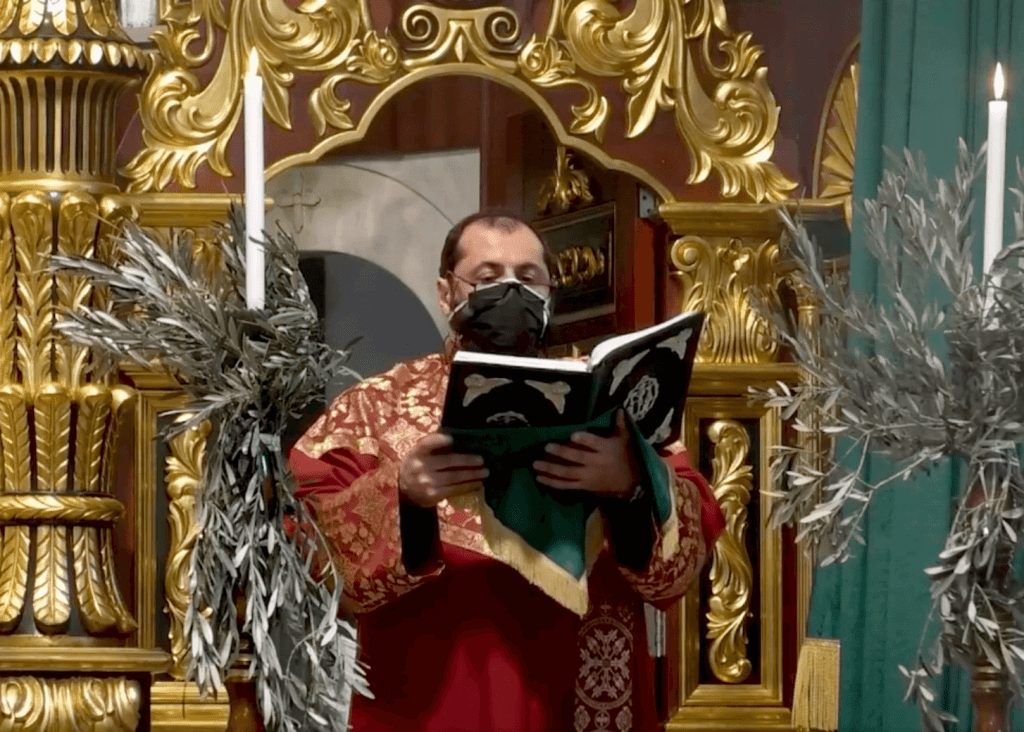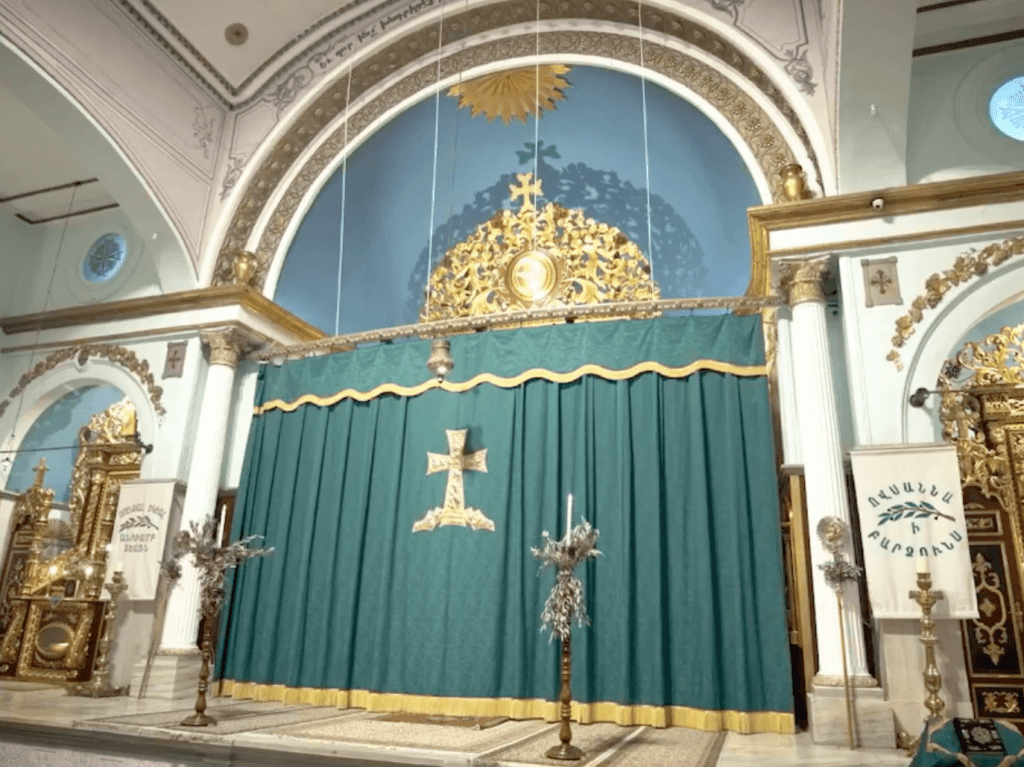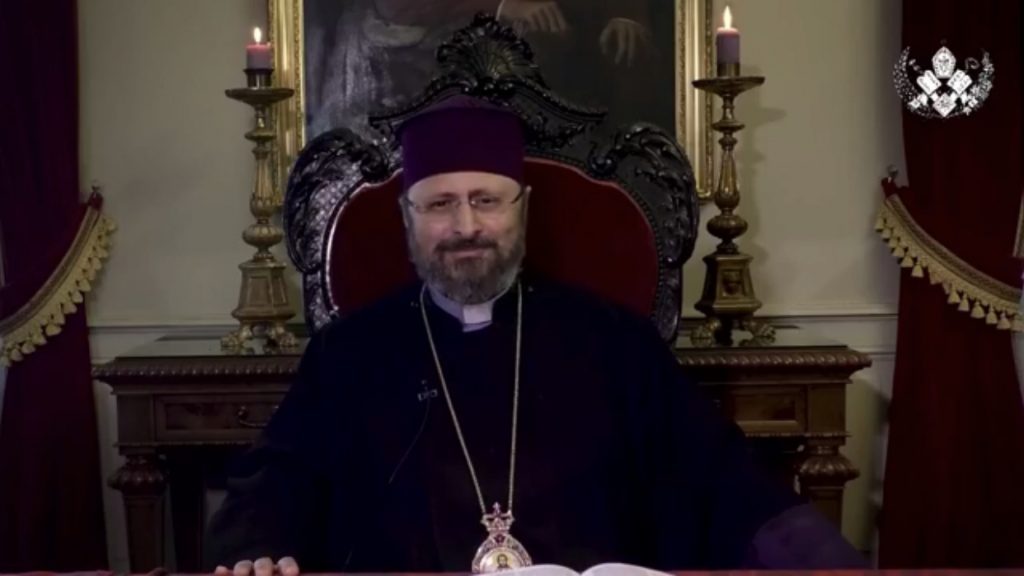As the Armenian Church enters the Great Week before the Feast of the Resurrection, “Dzaghgazart” (meaning decorated with flowers) celebrates the “Feast of the Entry of the Lord Jesus Christ into Jerusalem.” Patriarch Sahak II gave sermons in Armenian and Turkish.
During the Lent, in Armenian Churches, the last Arevakal (Sunrise) prayers took place on Friday, March 26. On Saturday, March 27, they celebrated the Resurrection of Lazarus and on Sunday, March 28, the Entry of the Lord Jesus Christ into Jerusalem, and performed the “Trinpatsek” (Opening of the Doors) prayers in the evening.

The last “Arevakal” prayer of this year’s Lent was held on Friday, March 26, at the Kumkapı Central Surp Asdvadzadzin (Virgin Mary) Church, under the presidency of the Turkish Armenian Patriarch Sahak II. At the end of the service, Patriarch Sahak II gave sermons in Armenian and Turkish. The ceremony was broadcast live on the patriarchate’s Facebook page.
Lazarus’ Resurrection was celebrated on Saturday, March 27. After the morning prayers, which were closed to the public, the altar curtains, which were closed during the Lent, were opened.

On Sunday, March 28, in all churches with religious functionaries, the Surp Badarak (Holy Mass) was held closed to the public due to coronavirus restrictions, and the Feast of Dzaghgazart (Entry of the Lord Jesus Christ into Jerusalem) was celebrated. Surp Badarak, published on the fb page of the Patriarchate, was presided over by Patriarch Sahak II and offered by Father Shirvan Murzyan. High Priest Zakeos Ohanyan and Priest Shnork Donikyan, the religious officer of the Church, were also present at the ceremony. At the end of the ceremony, “Hokehankist” (Ayin-i Ruhani) prayers were read for all those who sleep in the Lord.

“Sin Means To Be Separated From God”
Patriarch Sahak II gave sermons in Armenian and Turkish. In his Armenian sermon, he spoke about the meaning and importance of this feast. He started his Turkish sermon by explaining the meaning of today’s feast. Some of the titles from the sermon are:
“According to our scriptures, Jerusalem will be a city where peace and well-being will spread like a river to the whole world. It will be the center of God’s kingdom on earth. It will be the place where Christ will return when he comes a second time, and where he will begin the golden age for mankind. Of course, there is spirituality in religion, but what we call religion is not just spirituality. We can define what you call religion as the intertwining of the world and the spirit. Religion is the part of the spirit that touches the world. If it remains only a spirit, it cannot touch. When Jesus entered Jerusalem; This is an opening, a revelation.
The attributes of God are important for us to see and understand. For the first time, Jesus accepts praise, the king’s word. That is, things that are related to God must also be shown, praised, applauded, celebrated with great crowds, turned into a feast. It should turn it into an event that will be remembered. And God foresees holidays in the scriptures. He foresees holidays as a commemoration of particularly major events. And in all religions, the great events of their own religions are turned into feasts, thus engraved in the memory. Why shouldn’t the owner of everything, the creator of the earth and sky, be glorified with festivals? Why not be praised? Why don’t we talk for hours about Jesus Christ? We talk. And we are talking. We’ve been talking for ages and our church has turned this holiday into a big one. Don’t give the tax deducted to you if you want! But we are lazy to give God’s rights to God.
Holidays are a push to make room for God in our busy lives. And the saddest thing is, of course, for the religious, the days of the feast turn into holidays. The God in Jesus shows us the face of anger, as well as the face of wrath, as the face of love. And if we do not understand His quiet and gentle silence, if we do not recognize the opportunities He has given us, then another face will appear. There is something about God that we don’t like. God says <this universe is my universe, I created it, it will be as I want it to be. If it is not as I want, I will destroy it, I will make it again.> He showed this in the Noah’s flood. So our God is a God who has anger, can get angry, has a sense of justice and can do his will, whether it suits us or not. All these qualities are so perfect in God that we see the epitome of that maturity in Jesus Christ. God has patience, but patience is not eternal. We are the city of God, we are the city of God. God built this city for himself to take shelter in. We are temples that are alive, living and not made by hand. And right in the middle of this city, the tample, our heart stops.
Sin means separation from God. All humans have sinned since Adam and Eve, and the wages for sin is death. For this reason, there will be no stone left from this city, because we have sinned, we are mortal. This holiday, this feast of Dzaghgazart, tells us to accept Christ into our hearts. We want it to come into our lives. But when Christ enters our lives, he will not be pleased with what he sees there. Because our heart, our temple should be a house of prayer, but it has turned into a den of bandits, all kinds of connections, all kinds of emotions, all kinds of nonsense are there. You can call Jesus into your heart, he will come. But he will want to change the things he doesn’t like. And you will have to let Him. Either you don’t or you kill Jesus. You crucify Jesus. In our heart, in the center, there is a seat for God, there is the throne. And we expelled God from there, we sit ourselves. We sit down and say, I am the king, what I want will be done. Then the landlord comes, says, this is mine, step aside. And we say, I will cross you. I ignore you, I do what I want. So He says that there will be no stone on stone.
The feast is the feast of Jesus’ entry into Jerusalem, which awaits a radical change from us. He wants to get inside you too. He wants to make you beautiful, but to make you beautiful according to God. He wants to save you, to give you eternal life. Those who accepted Jesus’ entry into Jerusalem, those who accepted Jesus as king, those who accepted His resurrection, were saved. We too will be saved if we accept the coming of Jesus. If we say “Ovsanna”. When we say, “Blessed be the one who comes in the name of God,” and offer the Kingdom to Him, when we give the keys of the temple to Him, and when we say, “This is yours, I will be as you will.” Holiness and cleanliness are the primary characteristics of temples. There is no prayer in a polluted temple. It needs to be cleaned and anointed in order for that temple to be opened to worship again. Likewise, our hearts are unclean. Jesus needs to clean it up. I greet you with the blessings of Dzaghgazart, I bless you all. Spring is coming, let Dzağgszart holiday be the herald of good days, may our lives be filled with flowers. Stay in peace. Amen.”
“Tırınpatsek” (Opening the Doors) prayers were broadcast on the Facebook page of the patriarchate at 17:00 on Sunday evening. In this ceremony too, symbolically going to God’s door, knocking on the door with prayers and chants and opening the door (curtain) took place. After this broadcast, High Priest Zakeos Ohanyan spoke in Armenian, and Senior Father Dırtad Uzunyan in Turkish. In their sermons, they talked about the meaning and importance of the “Tırınpatsek” prayers.